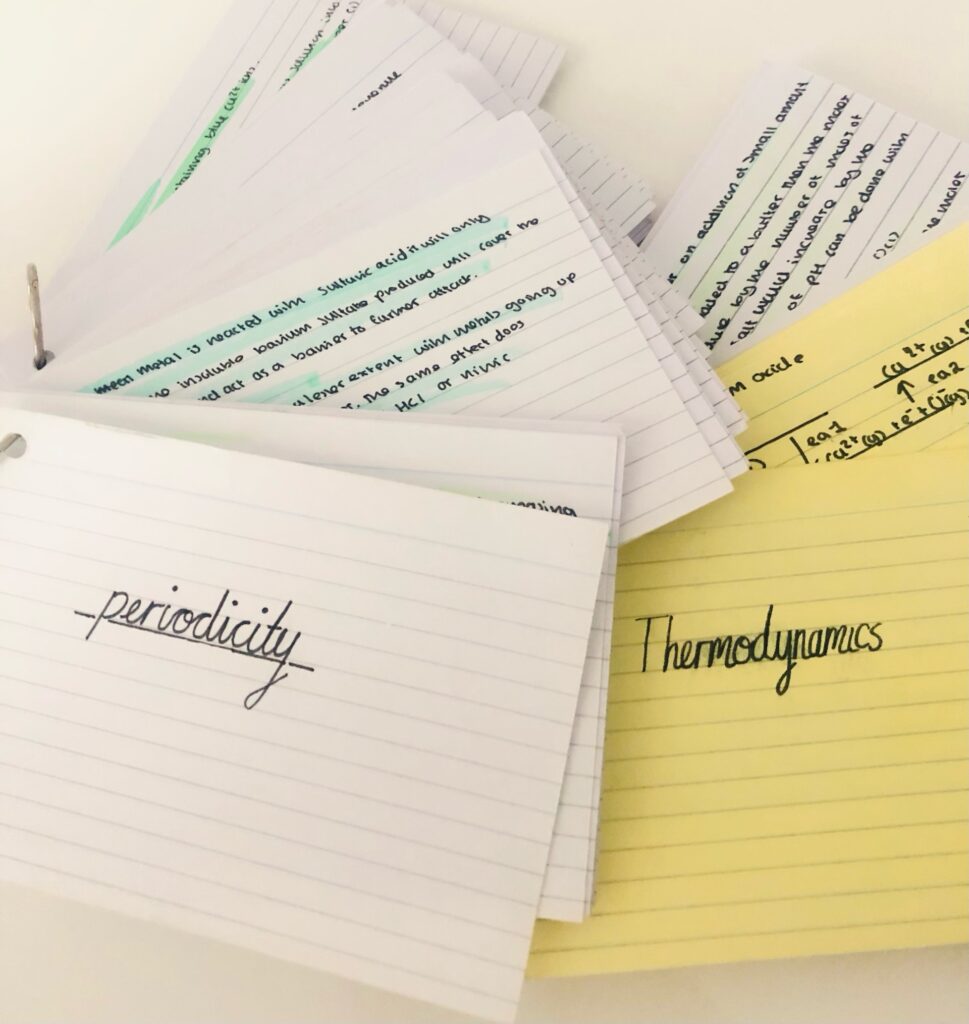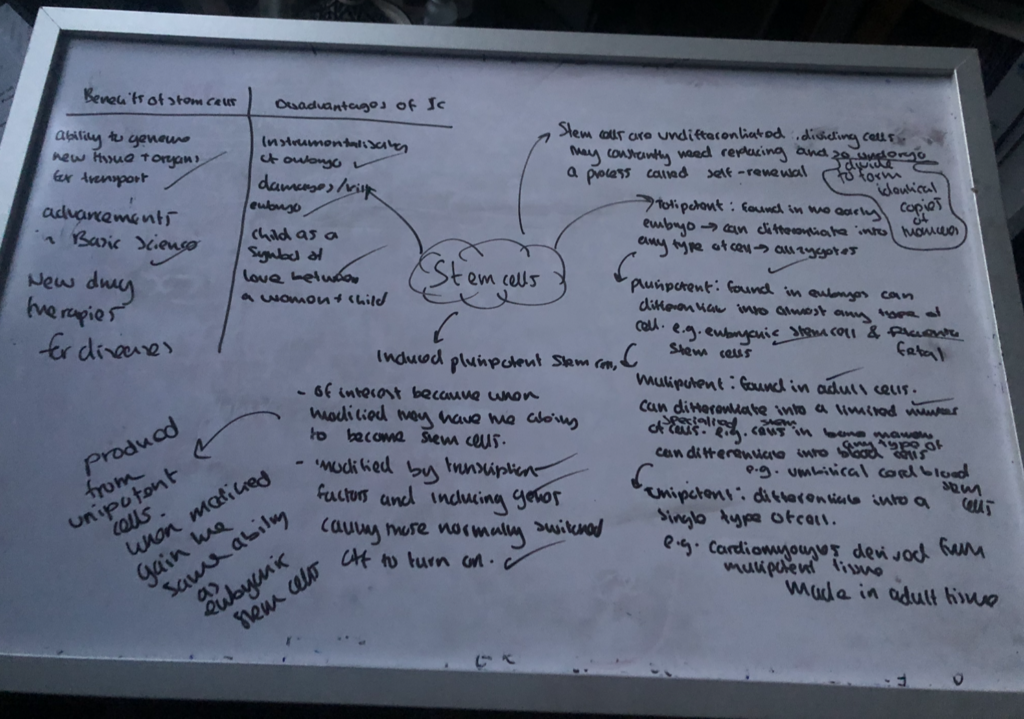Estimated reading time: 7 minutes

Introduction:
With exam season approaching I thought that this would be a good time to share my tips on how to get an A in A-level Biology. Just to provide you with a little background information, I studied AQA A-level Biology in 2023. And, as part of my Paper, I had to complete a 30 mark essay. Although my experience relates to this particular exam board and paper structure, I hope that my tips can be applied to all exam boards and will help anyone who wants to do well in Biology.
First, I want to talk about where I was at with my revision throughout the two years of sixth form. When I tell you I hardly revised throughout year 1, I am telling you the truth. I thought, like a lot of people, that I could do well with last minute revision. Unfortunately this is not the case, especially with content heavy subjects such as Biology.
Fast Forwarding to year 2, although I was trying my hardest to catch up with year 1 content, I was struggling with year 2 content and lost motivation to revise. Essentially, I just gave up. Then two months before my exam I decided to take my revision more seriously and aim to get an A*. My mindset was: Aim for an A*, settle for an A. Although I got an A, i was still really happy with this grade and I’m hoping that if your reading this now you can use these tips over a longer period of time and achieve higher.
Tip 1: Flashcards, Flashcards and more Flashcards…
Everybody always tells you the amazing benefits of using flashcards but until you find a strategy that works for you, you will never know the power they hold as a revision tool. Everyone I know who use flashcards all have different methods for how they use them. And that’s why people may not think that flashcards work for them. Simply because they don’t know the best technique to use.
For example, when I write my flashcards I write down every thing so that my flashcards are filled with information. Then after I have read what’s on the flashcard (and recited it aloud) I highlight everything with a green marker (every word).
Now for the longest time I thought that this was normal until my friend saw my flashcards and started asking me about them. The way my friend uses them is she writes a question on one side of the flashcard and then the answers on the other side and she quizzes herself. She also only highlights keywords, something that I tried and found didn’t work as effectively for me. I also know people who colour coded the flashcards, something which i also tried and found didn’t work for me.
My point is flashcards are great when you find a way to use them that work for you. Now if you don’t have much time to write your flashcards I would recommend writing condensed bits of information onto the flashcard. Then revise them and get someone to test you. And if you are really struggling for time, I would recommend only writing the content you find difficult onto the flashcards to save you time.

Tip 2: Blurting
Now, if you have been on YouTube searching for revision techniques you will most likely have come across Blurting. Blurting is something I have used for the longest time and it never fails me.
Essentially what it is, is reading some sort of text, covering it, and writing down everything that you remember. After this you go back and see what information you have missed and add it in.
Personally, I never enjoyed this blurting technique. And I never used to enjoy writing down anything when I was blurting. Instead I would read my flashcards and then simply turn them over and say what I had just read aloud. I would even get someone to test my knowledge. This also helped me save time as I didn’t have to write down anything.
However if I had nobody to test me that day I would create a mind map on my whiteboard. For some reason I remember so much more when I write on a whiteboard.

Tip 3: Learn what type of learner you are
Did you know there are 4 main types of learners? We have visual, auditory, kinaesthetic and reading/writing learners. Personally I am a Kinaesthetic learner and retain information better when I am moving around. For example, whenever I revise my flashcards I walk up and down my house. This miraculously helps me retain much more information compared to when I’m just sitting down. Now, you may gravitate more towards Visual learning in which case you do well understanding things when there are photos or graphs involved. Or maybe you learn better when you are listening to someone who is telling you information or hearing recordings of your voice reciting information. In which case you may lean more towards auditory learning. Most of the time you will find that you are mixture of all of these learning types.
Find what type of learner you are and use techniques that correspond to that type of learning style. Many people already know what works best for them but researching these different techniques can be beneficial for your revision. knowing what type of learner I am helped me a lot when revising A-level biology.
Tip 4: Don’t try to just remember the content; try to understand it too…
When I was in sixth form this was one of the biggest mistakes I made. I thought that if I could just remember everything word for word I would be able to get a good grade. However, this is just not true. The way the questions are designed for A-level Biology make the students have to apply their knowledge and actually understand what is happening.
It is really important that you understand all of the concepts and go to your teachers for help or attend support sessions. This is especially important for lab questions. There are also amazing online resources that I used. For example youtubers such as Primrose Kittens and Miss Estruch saved my exams . I mean Miss Estruch basically predicted the 2023 AQA Essay questions, which I believe is one of the biggest reasons I was able to get an A. There are also many predicted papers you can find for free or for a small cost (my school were generous enough to buy them for us).
Tip 5: Past Papers are your best friend.
I can guarantee that your teachers have already stressed the importance of past papers. They are totally right in doing so. Past exam papers and predicted papers are the best way to apply your knowledge. There is not much to say about completing exam papers but I do have a few tips which I feel allowed me to get a good grade.
The first tip would be to mark as you go along. I can’t speak for everyone when I say this but I had this one problem whenever I was doing past paper questions. I just couldn’t remember my thinking process when I went back to mark it and I was always too lazy to read through everything that I wrote. To minimise this problem I would just complete one question and then mark it straight after.
Another tip for A-level Biology is that exam boards tend to ask the same sort of questions every year. I mean there is only so much they can ask right? I would advise remembering these questions mark schemes word for word. When I was studying for my exams I had write down all of the 4-6 long answer questions and revised the mark scheme answers for them as they are similar each and every year.
Conclusion:
This concludes this weeks blog post. I hope that you now have a better idea of what you can do to begin your biology revision. I also think its important to mention that we do perform better when we are living healthier and managing our stress. Another extra tip is to excercise, drink lots of water and eat healthy food as well as minimising your stress levels. All of these have been proven to help retain more knowedge.
Good luck for your exams!